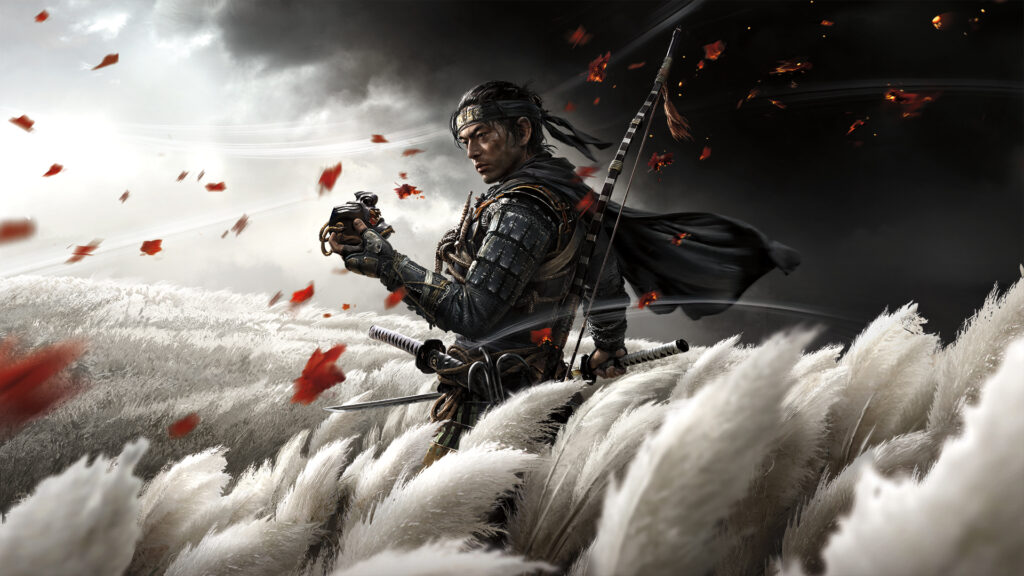
Ghost of Tsushima and the Importance of Lady Masako’s casual queerness
What does it mean to be honorable?
This is the question Jin Sakai often asks himself as the plot of Ghost of Tsushima unfolds, and the importance of being honorable is a point of contention between Jin and his uncle, Lord Shimura, throughout the island’s fight against the Mongol invasion. However, there is one key moment where Jin subverts the player’s expectations regarding honor in a world focused on rules and tradition: Lady Masako’s very personal moment of vulnerability when she reveals her affair with another woman.
Lady Masako’s disclosure of her sexuality was striking, and something I resonated with heavily beyond the surface level joy of queer representation in a popular AAA video game, although for days, I couldn’t quite figure out why.

Even after beating Ghost of Tsushima, my mind kept wandering back to that moment, the way Lady Masako speaks to Mai, revealing her love and past secret relationship, all in front of Jin, who quietly observes until the moment ends. That’s when it hit me – Lady Masako’s scene with Mai was so heartbreakingly touching as a queer person because it is so different than what we’ve been trained to expect in media.
It’s not a scene where Lady Masako sits Jin down, saying she has something important to tell him. It’s not a scene where something has gone horribly wrong, and Jin walks in at the wrong time or overhears the wrong conversation. It’s a scene where Lady Masako, a woman who Jin thinks of as honorable, strong and intelligent, boldly announces her feelings regarding the person she loves, another woman, in front of a trusted friend with no fanfare, no sensationalism, no drama.
Instead, the focus is on Lady Masako, her goals and her motivation as she struggles to confront a murderer and come to terms with her family’s death. Jin, who represents the player’s point of view as the game’s protagonist, isn’t involved in the conversation that ultimately informs the audience of Lady Masako’s queer relationship because it’s not about him. It’s about her, and she’s a normal, human person grappling with the horrors of war just like he is. It’s her survival and her pain that’s important to Jin, not her sexuality.

Although queer representation is found more often in media these days, it still feels rare to find a depiction of a queer character that is so impactful and unexpected as Lady Masako. A player could complete all of Ghost of Tsushima without knowing that this scene exists, even though it’s not hidden. Lady Masako’s sexuality is not a secret, but it’s also not central to her character, just like being queer is a part of my daily life without being my only defining characteristic. In that way, Lady Masako’s presence as a queer person feels very grounded in reality, and that’s empowering to stumble across as a member of the LGBTQ+ community.
Of course, part of Ghost of Tsushima’s success regarding queer representation lies in Jin’s reaction to Lady Masako’s reveal. Instead of questioning Lady Masako or berating her for cheating on her husband, he accepts that the situation is complicated and that it’s not his place to judge her.

Even when Lady Masako feels compelled to justify her actions, as we so often do when confronted with bigots or uncertainty in our lives, Jin assures her that it’s unnecessary. Furthermore, Lady Masako acts as a representation for an often underserved group in the queer community when she tells Jin that she loved both her husband and Mai. She doesn’t say that she loved them differently or that she loved one more than the other, but that she simply loved them both. Again, Jin accepts this immediately, a small act that can mean so much to bisexual and pansexual gamers who are often invalidated from those both outside and within the LGBTQ+ community.
Although Lord Shimura sees Jin as dishonorable for becoming the Ghost, players and characters within Ghost of Tsushima grow to love and appreciate him and what he stands for as he fights for his homeland against the invading Mongol army with an almost fantastical sense of reverence. Because of this, Jin’s unhesitating vocal support of Lady Masako speaks volumes, both to the real world audience of the game and Lady Masako herself. While for some, Lady Masako’s story may be just another side quest, for others, especially for those in the queer community, it’s something deeply personal, reassuring us that we are seen, heard and valued, regardless of our sexuality. What could be more honorable than that?





